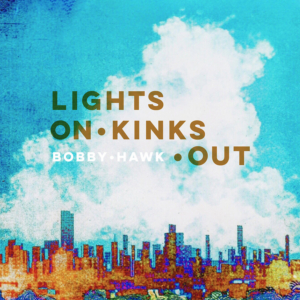Bobby Hawk to Release First Solo Album LIGHTS ON KINKS OUT

Having performed with the likes of Abigail Washburn and Noam Pikelny, Brooklyn-based fiddler Bobby Hawk (aka Robert Hecht) is no stranger to excellence. But after years of touring, and in the aftermath of a personal breakup, something singular and new began to emerge. "It sounds cliche, but it was the end of one of those relationships where you go, 'Screw it, I'm gonna go get a tattoo and buy a guitar,'" says Hawk. "These songs just started pouring out." The result is Hawk's first solo album, Lights On Kinks Out (out November 1), a sprawling indie rock opus and revelatory songwriting debut from a roots music stalwart.
Raised in a small town in central Illinois, Bobby Hawk was thrust into musical performance from an early age by his multi-instrumentalist father, who would bring him to gigs throughout the region. Eventually he began attending Mark O'Connor's fiddle camps and festivals throughout the Midwest, where he met musicians like Casey Driessen and Noam Pikelny. "They kind of opened me up to what was possible because they were so virtuosic at such a young age," he says. His gigging with jazz, bluegrass, and country bands became a full-time professional career, moving to New York and performing alongside artists like Abigail Washburn, Noam Pikelny, Blue Merle, Phosphorescent, Heather Maloney, and Stefan Amidon. Years later, after the breakup of a relationship that had brought him to Massachusetts, Hawk found himself on the road back to New York. "The day that I drove back to New York I texted my buddies and said, 'Hey, I'm coming back.' And they were like, 'Come tonight to Mona's. You're in the house band.' And suddenly there was this revelation and a new sense of identity, realizing how much community I had in New York, that these were my people, this is what I do for a living."
With this new sense of identity, Bobby Hawk sat down to begin work on his first body of solo work. "Fiddle doesn't really lend itself to songwriting the way the guitar does," says Hawk, "so it was amazing to pick up the guitar and be able to process this new stage of life in a different way." After sharing some of this work with friend and producer/multi-instrumentalist Ryan Hommel (Amos Lee, Stephen Kellogg, Heather Maloney), Hawk's cathartic exercise began to take its true form. "I just played him a snippet of this little ditty on guitar. It wasn't really anything to write home about. But he was really enthusiastic about recording this stuff and it quickly went from a fiddler noodling on a guitar like a novice to us making the album."
In the studio, Hawk and Hommell crafted a tracklist that weaves its way through disparate musical influences. "The studio is just a magical place to kind of see what things can become," says Hawk. "Throughout those years touring with jazz, country, and bluegrass bands, I'd go from playing on stage to getting in the van and putting on something like Radiohead, or Laura Marling, or Daniel Lanois. Working on the album was like opening the book to whatever sounds we wanted to tap into, allowing us to actually pull from what I had been listening to." To realize this vision, Hawk and Hommel assembled a dream team of musicians, enlisting vocals from Ana Egge, Krystle Warren (Jonathan Wilson, Rufus Wainwright), and Zara Bode (The Sweetback Sisters), drums from Noah Bond, J.J. Armstrong, Colin Jalbert (Heather Maloney), and woodwinds and keys from Alec Spiegelman (Darlingside, Okkervil River, Kevin Morby), Seth Glier, Darby Wolf, and Zac Colwell (Of Montreal, CHAPPO). The result is a stunning achievement that channels Sun Kil Moon and Jon Brion-era Aimee Mann & Elliott Smith ("States Apart," "Future Strangers"), Sam Amidon and Richard Buckner ("Let Things Go," "The One,"), and Bon Iver, The Helio Sequence and early cuts from The National & Elbow ("Long Gone," "Time & Time Again," "Hammer"). As its ballast, however, Lights On Kinks Out has Bobby Hawk's haunting baritone, underpinned by his first-hand, intimate understanding of the heartbreak and harmony in country duet balladry, ("Carry Me Through") and the structural movement of a folk song ("Salt & Liquor"). Like a scar or a tattoo, Lights On Kinks Out is the mark of a change from what was, a reminder that something singular and new has begun to emerge. •
Comments

Videos

